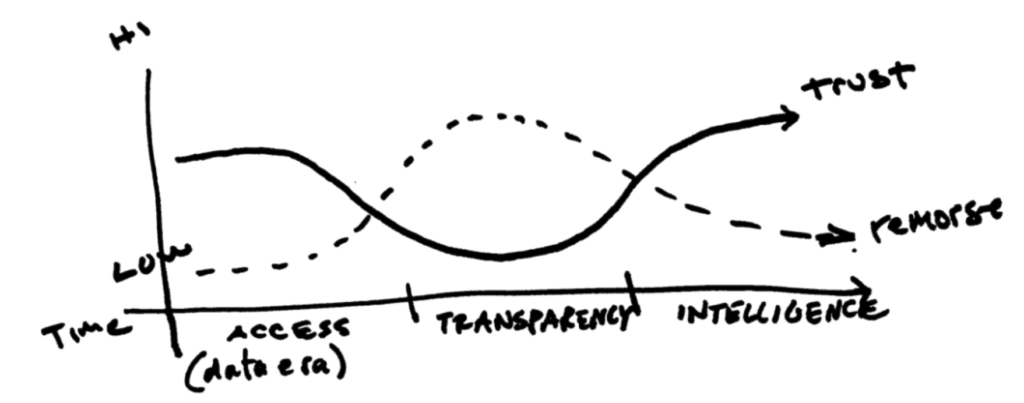Opinions may differ on the ultimate impact of artificial intelligence (AI) on humankind, but there is little doubting that it will have a significant affect on real estate. Some may see it as part of the quiet but insidious take over by the Machines. First it was our music. Then our movies. Then what we buy, eat and drive. It’s over when they take control of our homes because we’ll be literally living in a Hollywood cliché of an AI apocalypse …
A less dark scenario is that AI will be the thing that saves the real estate industry. Some companies already use AI as a financial vehicle to arbitrage housing inventory. Others are pursuing AI for process automation, to make the transaction cheaper or agent better or CRM more effective. But despite real estate tech advancement, 2/3 of today’s homebuyers report buyer’s remorse. That’s where the highest and best use of AI comes in: finding the right home. Ironically, it’s the Machines, through intelligent personalization, that will heal the home buying process by restoring to the home buying process a fundamentally human value: trust.
Let’s step back. The below-scribbled chart, the inspiration for this piece, describes the inverse relationship of trust and remorse in the real estate industry, overlaid on our relationship with data over time. It frames how we got here and where we could go. Despite its rough and humble appearance, this chart is not water-cooler whimsy, but a working theory based on real data (much of it from National Association of Realtors surveys, 2015-2000).
Trust, Remorse and our relationship with Data
Prior to and through the Data Access Era (which began with the advent of the WWW), trust in the real estate space was still placed in the real estate agent. He or she proffered access to a proprietary database, knowledge of a confounding process and wisdom about neighborhoods and listings. The agent would show the best options to the buyer who would ultimately be satisfied with picking the best of those options. Trust was high, remorse low.
When Zillow cracked open the Multiple Listing Service (MLS) in mid-2000s, granting the world access to every listing, we entered the Data Transparency Era. The old script was flipped, “the customer doesn’t know what they want, until you show them,” became, “the more you show the customer, the more likely they’ll know what they want.” More listings, more pictures, and more agents meant more control, a better experience, and a better home. That’s still the lure, and over 90% of homebuyers use online search services like Zillow. Others like Redfin have joined the conversation with promises of using technology to make the process cheaper and easier. Despite these promises and market penetration of these companies, buyer’s remorse is reaching new heights. Trust is diving. What gives?
Too much too soon
Transparency solutions have eroded the agent’s core value to consumers, which is still trust. Zillow’s old-school disintermediation model turned agent selection into referral bidding. The typical brokerage business model changed to one built on high lead volume and low closure rates. The agent role was commoditized, diminishing the relationship, experience and service levels provided to buyers.
Buyers want their agents to “help find the right home to purchase,” four times (yes, 4x) as much as they want help with price negotiations or process. This stat flies in the face of two decades of real estate marketing and tech innovation. Agents are now actually unsuccessful at meeting their clients’ top need, failing to find their homes over 2/3 of the time. Interestingly, when choosing an agent homebuyers care most about trust, five times (5x) whether the agent uses the latest technology. So it’s safe to say that over 2/3 of the time, none of the new fangled tech matters. Trust has been betrayed.
The Transparency Era has left buyers on their own sorting through countless poorly-suited listings and images, at the mercy of the Paradox of Choice (see “Homebuyers have a lot of choices and that’s not a good thing”). Technology’s gift: an average of 20 gigabytes of data and images, and mind-numbing trade-off analyses. Over 80% of buyers report having to compromise. Trust in the process is lost.
There’s no data like your own
The new Data Intelligence Era offers hope by way of trust through intelligent personalization. We’ve begun to trust AI in many areas of our daily lives implicitly. An AI’s recommendations are more than just convenient, they are comforting on another level because they allow us to let go of decision-making anxiety and the accompanying self-doubt that comes with too many options. Today’s convergence is not around a device or platform, but the individual. The perception, however real, that something was made or found for us specifically is unavoidably powerful. In fact, 80% of consumers are more likely to purchase a brand if it’s personalized (Epsilon report, 2018).
What the smartest AI would do to find the “right” home
It would get to know everything about the home buyer first. Start with what styles and floor plans and furnishings they like and what features, windows, and neighborhoods catch their attention. Track of their interactions with images, uploaded photos and listings. Learn where they are in life and expect from their lifestyle, where they like to spend time, where they need to be, and what they like to do. Use machine learning to constantly fine tune the relationship and make it stronger. Take all of memories from this shared experience and perform a ridiculous multivariate trade-off analysis that considers both needs and preferences. The smartest AI real estate solution would be the ultimate antidote to too many, ill-fitting, options, and try its hardest to prevent discontent. The buyer, having invested themselves at every interval will have no choice but to trust the end results — they would be the best reflection who the buyer is.
The way AI will re-invent the real estate industry not by magically cracking the code and fixing an antiquated and anxiety-ridden process. It will be by aligning technology’s priorities with those of the buyer, and first and foremost with a focus on finding the best possible home for the individual buyer. It will do this treating the process as a relationship rather than the transaction.






